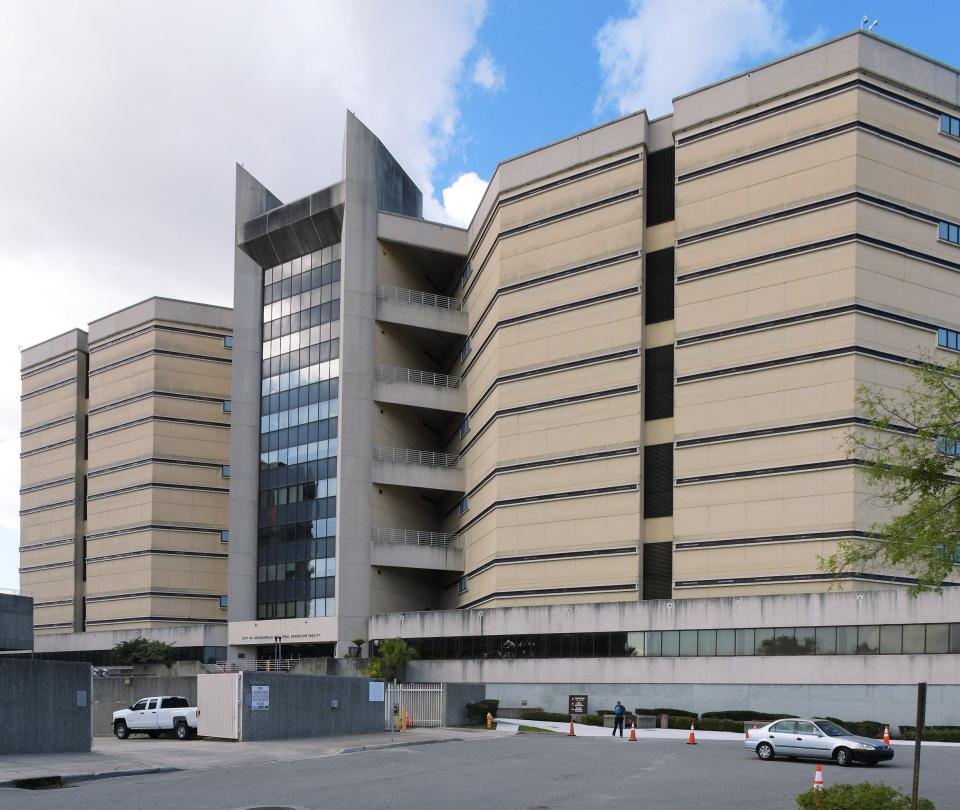A 'humanitarian crisis': The Bail Project comes to Jacksonville to get people out of jail
A nonprofit has opened in Jacksonville to help low-income people pay their bail and get out of the county's pre-trial detention facility, as well as provide pretrial support to help people return for their court dates and avoid a warrant.
The Bail Project, a national nonprofit that has opened three locations in Florida, including Jacksonville. It wants to prove that the current bail system is unjust and unnecessary and to show that there are more equitable ways to make sure people show up for court dates other than bail.
"We have overcrowded jails where the vast majority of people are simply awaiting court dates. So, we knew that it was critical to offer an immediate lifeline to these folks who are disproportionately Black, Latino, minorities, women," said Camilo Ramirez, the communications officer for The Bail Project.
USCIS:Rights groups seek 'immediate release' of immigrants held at Baker County detention center
Jail death:No charges filed in death of Duval County jail inmate who died after altercation with guards
The Bail Project, which started operating in Jacksonville in May, has already helped at least a few dozen people pay their bail, get out of the Duval County jail and get back to their regular life while awaiting trial. The nonprofit's services are free for participants.
Once an employee of the nonprofit interviews someone being held in jail, they determine if the person is eligible for the program. Then the nonprofit pays the person's bail directly to the court and they are released.
But Jacksonville is just a small piece of a larger problem in Florida.
Over 70% of the jail population in Florida consists of people who haven't been convicted of a crime in court, according to data provided by The Bail Project, and most are sitting behind bars awaiting court dates because a judge has set bail they can't afford.

Unaffordable bail disproportionately impacts Black Floridians, who make up nearly 50% of the pretrial population in Florida, but only 17% of the state's general population, according to data from The Bail Project.
As of last year, The Bail Project has helped about 23,000 low-income people in more than two dozen places across America — over 90% of those people have returned for court dates.
Ramirez said that shows most people will return to court without the financial incentive that bail is supposed to create.
Along with posting bail, The Bail Project's local team provides court reminders, transportation assistance, and referrals to community services.
"When we talk about the amount of money that we're spending on these jails, when we talk about the issues that people are dealing with in those jails, from substance use to mental health to homelessness ... what exacerbates it is the fact that a lot of those folks are there just because they don't have money," Ramirez said.
Good deed attorney:Freed to Run crosses the finish line to raising $2.25M for Jacksonville Area Legal Aid
Police shooting:Ex-cop arrested, charged with murder in 2020 shooting death of Jacksonville man in Illinois
A two-tier system of justice
Katie Poor, who joined The Bail Project in 2021 as the supervising attorney of the criminal and legal policy team, previously worked as a public defender in New York and Mississippi. She says that money has corrupted the basic principle that you're innocent until proven guilty and created a "two-tier system of justice" she witnessed firsthand.
"They can go to their lawyer's office and meet with their lawyer. They can't keep their jobs. They can pay their rent. They can take their kids to school," Poor said of people stuck in jail unable to pay bail.
It frustrated her that people were also more likely to take pleas whether they were guilty or not just to get out of jail sooner.
Charlie Cofer, public defender for the 4th Judicial Circuit, agrees. The Office of the Public Defender lets the nonprofit use some of their office space, though he says they have their own computer systems and employees. Cofer says his office has also provided them with easier access to people in the jail, doing background checks on the nonprofit employees and vetting them.
Cofer believes The Bail Project will be an "improvement of the justice system." He too sees clients stuck in jail without the money to pay bail accept pleas just in order to get back to their lives, even though they could have a solid defense of innocence.
"I think many people in our community think that all the people in jail are unemployed ne'er do wells. That's not the case," Cofer said. "There are many people that get caught up in the criminal justice system that are employed... But they just don't even have the minimal funds because they go to work, they get paid at the end of the day, that's used for food and other things to support their family."
If you or someone you know needs help paying bail, fill out the form at bailproject.org/help/.
This article originally appeared on Florida Times-Union: The Bail Project opens in Jacksonville to help people pay bail costs

